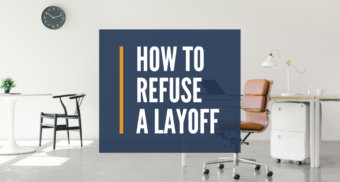If I have more seniority at a company, should I be asked back to work first? – Globe and Mail

If I have more seniority at a company, should I be asked back to work ahead of my colleagues?
Lior Samfiru is a Canadian employment lawyer and co-founding partner at Samfiru Tumarkin LLP. He was asked by Andrea Yu in the Globe and Mail’s Nine to Five section to provide his expert opinion on the matter as it pertains to the COVID-19 pandemic. He touched on temporary layoffs, severance pay and more in his response.
LEARN MORE
Globe and Mail employment lawyer
THE QUESTION
My team had a large number of staff that were temporarily laid off due to COVID-19. We all do the same job. One co-worker was asked to return to work before me, even though I have been working at the company three years longer. I haven’t been asked to return yet. I am 48 years old, so more than a decade older than the co-worker that was asked to return. I also live farther away from the job location, requiring me to take public transit, and the co-worker asked to return lives closer and can walk. If I have higher seniority, should I have been brought back first? Can they bring back younger or other workers first if they are at a lower risk? We are not unionized.
THE ANSWER
It is important to remember that in most cases, a temporary layoff may be illegal, in that it gives the employee the right to treat the layoff as a constructive dismissal. An employee who is laid off would have the right to either treat it as a termination, or accept it and await being recalled back to work.
Where the employee chooses to accept the layoff, seniority does not have to be considered when recalling employees back to work. Non-unionized employers do not have to account for seniority or even experience when recalling employees. It is the exclusive right of the employer to determine the needs of the business as well as which employees best meet these needs. This means that a more junior employee may be recalled before a more senior one. It also means that an employer may choose whose employment it wishes to terminate.
The exception is that an employer cannot base its recall or termination decisions on discriminatory factors. An employer is not allowed to consider things such as age, race, ethnicity or place of origin. Such improper considerations would result in violations of human rights legislation.
In addition, when recalling employees, a company may also not consider whether an employee suffers from a disability. While the employer may think that it is trying to protect its employees, it is not up to the employer to determine whether an employee is too vulnerable to work. It is up to the employee and the employee’s doctor to seek accommodation, if needed, and an employer that is too proactive may find itself on the wrong side of a discrimination claim.




